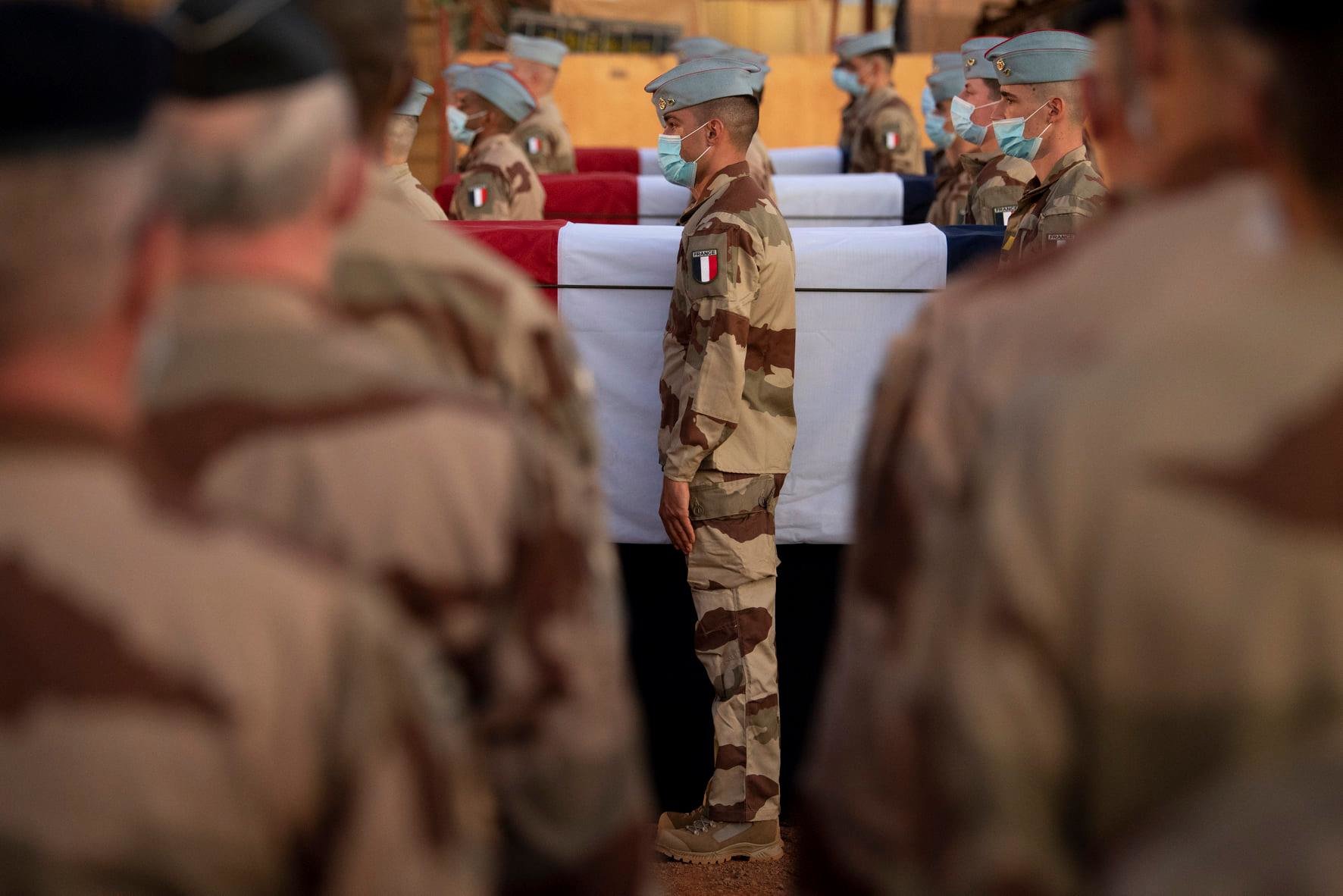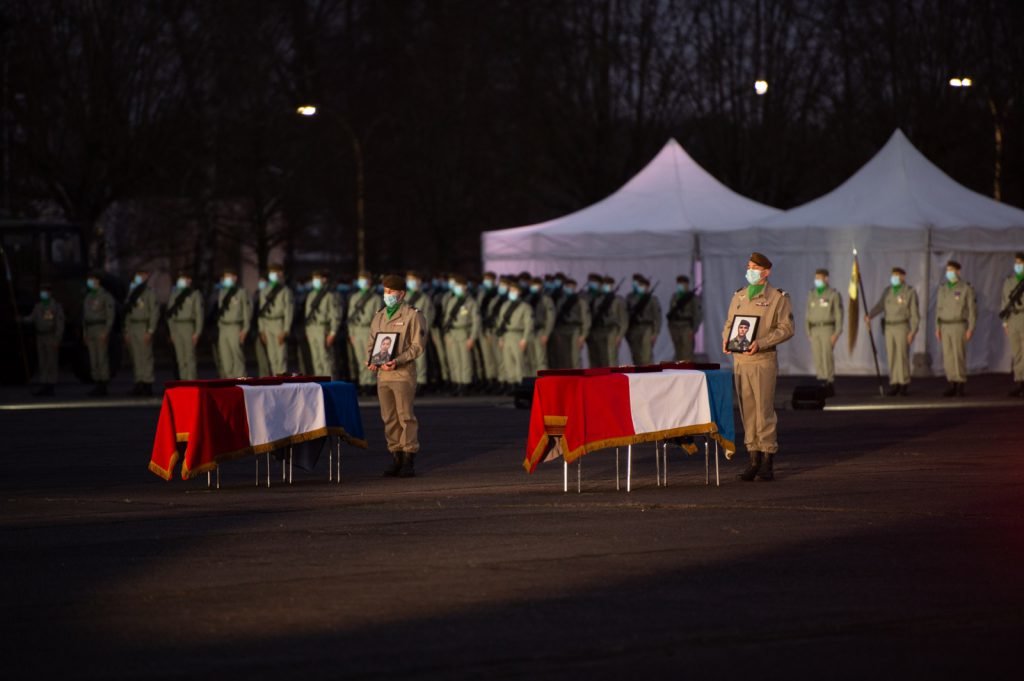After IED Attacks in Mali Kill 5 French Soldiers, Macron Vows ‘Battle Against Terrorism’ Will Go On

A memorial ceremony for French soldiers killed in Mali on Dec. 28. Photo by French Army via Twitter.
French military forces in West Africa suffered a series of deadly improvised explosive device attacks over the past two weeks, marking a worrisome uptick in violence for France’s counterterrorism campaign against Islamist extremists in the embattled Sahel region.
Bombings in Mali on Dec. 28, 2020, and Jan. 3 killed a total of five French soldiers, bringing the number of French deaths to 50 since counterterrorism operations in the region began in 2013. Six more French soldiers were wounded on Friday when a vehicle-borne improvised explosive device, or VBIED, struck their armored vehicle while on patrol in the embattled “Three Borders” region between Mali, Burkina Faso, and Niger.
Operating alongside soldiers from Mauritania, Chad, Mali, Burkina Faso, and Niger, France has some 5,100 troops deployed to Africa’s Sahel region as part of an ongoing counterterrorism mission called Operation Barkhane. Since its inception, the French operation has reportedly killed more than 600 terrorists.
Profonde tristesse à l'annonce des décès du BCH Tanerii MAURI, du 1CL Dorian ISSAKHANIAN et du 1CL Quentin PAUCHET, engagés dans l’opération #Barkhane et morts au combat. Pensées émues de toute l’@armeedeterre pour leur famille, leurs proches et leurs camarades du #1RCH. pic.twitter.com/nA7kxCoOZq
— Chef d'état-major de l'armée de Terre (@CEMAT_FR) December 28, 2020
A roadside bomb killed three French soldiers during a mission in southern Mali on Dec. 29. Two more French soldiers died on Jan. 3 when their armored vehicle struck a hidden explosive device during an intelligence mission in Mali, French defense officials said, and another soldier wounded in that attack was listed in stable condition.
Among the dead on Jan. 3 was a 33-year-old sergeant named Yvonne Huynh. The mother of a young child, Huynh was the first female French soldier to die during Operation Barkhane.
Profonde tristesse à l’annonce des décès au combat du SGT Yvonne HUYNH et du BRI Loïc RISSER dans le cadre de l’opération #Barkhane. Pensées émues de toute l’@armeedeterre pour leurs familles, leurs proches ainsi que pour leur camarade blessé.#FiersDeNosSoldats ?? pic.twitter.com/PQclXF6Erf
— Chef d'état-major de l'armée de Terre (@CEMAT_FR) January 2, 2021
The recent spate of combat deaths comes amid a debate in France about the wisdom of continuing Operation Barkhane. Some quarters have called for negotiations with militant groups as a means to extricate French forces from the conflict. For his part, French President Emmanuel Macron issued a statement following the Jan. 3 bombing in which he pledged to continue France’s “battle against terrorism” and expressed his “great sadness” over the recent losses.
In January, Macron reaffirmed France’s commitment to counterterrorism operations in Africa, pledging another 220 troops to Operation Barkhane.
The Sahel is a vast region stretching more than 3,000 miles across Africa, from the Atlantic in the west through Sudan in the east. Northern Mali fell under the control of terrorist groups in 2012, creating a lawless space akin to what Afghanistan was like prior to America’s 2001 invasion. Operation Barkhane removed the militants from power, but they retreated to redoubts in the Sahara desert from which they continue to mount attacks on Malian forces and their allies.

One line of thinking among regional security experts is that Islamist extremist groups in West Africa and the Sahel — including Al Qaeda, ISIS, and Boko Haram — have purposefully avoided high-profile attacks during the past few years to avoid provoking the kind of unified Western military response that led to the destruction of ISIS’ so-called caliphate in Iraq and Syria.
However, the recent targeting of French forces in Mali, in tandem with an uptick in violence in Nigeria by the Boko Haram Islamist extremist group, has spurred some experts to speculate that the region’s extremist groups may have changed course and adopted a more aggressive posture.
The Group to Support Islam and Muslims (GSIM) — an Al Qaeda-affiliated militant jihadist group operating in North Africa — claimed responsibility for the Dec. 29 attack that killed three French soldiers.
A French commando raid in November reportedly killed some 30 GSIM militants. The French military also announced in November that it had killed a key GSIM commander, Ba Ag Moussa, during a “high level operation” involving ground troops and helicopters in northeastern Mali.
On Tuesday, a French airstrike in central Mali reportedly killed “dozens” of militants.
Some 25 Islamist militant groups operate across Africa, according to the US Department of Defense. About 6,000 US defense personnel are currently deployed to Africa.

BRCC and Bad Moon Print Press team up for an exclusive, limited-edition T-shirt design!
BRCC partners with Team Room Design for an exclusive T-shirt release!
Thirty Seconds Out has partnered with BRCC for an exclusive shirt design invoking the God of Winter.
Lucas O'Hara of Grizzly Forge has teamed up with BRCC for a badass, exclusive Shirt Club T-shirt design featuring his most popular knife and tiomahawk.
Coffee or Die sits down with one of the graphic designers behind Black Rifle Coffee's signature look and vibe.
Biden will award the Medal of Honor to a Vietnam War Army helicopter pilot who risked his life to save a reconnaissance team from almost certain death.
Ever wonder how much Jack Mandaville would f*ck sh*t up if he went back in time? The American Revolution didn't even see him coming.
A nearly 200-year-old West Point time capsule that at first appeared to yield little more than dust contains hidden treasure, the US Military Academy said.












